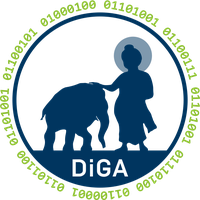
DOAM Director visits CERES: Present and Future of a Key Partnership
From Thursday 23rd of September until Monday 27th, the Center for Religious Studies (CERES) of the Ruhr-Universität Bochum held a series of meetings in connection to the official visit of Dr Abdul Samad, head of the Directorate of Archaeology and Museums of the Province of Khyber Pakhtunkhwa (DOAM). This visit falls within the framework of the DiGA project and gave an opportunity to discuss viva voce the scopes of the collaboration between our institutes. The intensive three days program has proved crucial to ensuring a smooth running of the project, especially in view of the fieldwork trip planned for this November.
The DOAM is a key partner in the DiGA project, granting us unlimited access to the collection and facilitating in situ research with personal, technical, and administrative support. It is also a significant actor of research on and diffusion of knowledge about the multi-religious history of Gandhara as well as other topics connected to the history of Pakistan. The aim of the meeting was not only to discuss various scientific and administrative issues linked to the DiGA project but also to sketch avenues for future collaborative research between the DOAM and CERES.
On the first day of the meeting series, Dr Tim Karis (Scientific Coordinator, CERES) and Prof Kianoosh Rezania (Chair for the History of West Asian Religions and Director of the Käte Hamburger Kolleg, “Dynamics in the History of Religions”, CERES) joined the discussion and delivered a thorough introduction to the many activities and projects of the CERES. On the same day, Dr Abdul Samad took the stage to present the DOAM. Dr Abdul Samad gave a breathtaking overview of the impressive work this institution conducts in three key areas: archaeological excavations, conservation projects and public outreach. The DOAM has about 40 ongoing projects giving work to more than 500 people.
The afternoon session of the first day has been fully dedicated to the presentation of the DiGA project by the project leaders Junior-Prof Jessie Pons and Dr Frederik Elwert, with some sneak-peeks on the first tasks accomplished by the team members Serena Autiero and Cristiano Moscatelli on the thesaurus of terms to describe Gandharan sculptures and the archaeological gazetteer of sites from which the sculptures stem.
Day two was centred around practical issues. First Serena Autiero presented the proposal for a training program that will be offered to the DOAM staff during the forthcoming DiGA field trip. Thanks to the many insights offered by Dr Abdul Samad, we are now ready to do our best to guarantee knowledge transfer and fruitful exchange with our Pakistani peers. In the second part of the meeting, Cristiano Moscatelli and Frederik Elwert presented the software, concepts and a mock-up to create an online exhibition with museum objects.
The final day was focused on possible collaboration beyond the DiGA project in the key fields of research, teaching, and knowledge transfer. The attendees discussed possible avenues, additional partners, and possible sources of funding, outlining an agenda for the future. While the DiGA project is currently focused on the specific digitization task, its partners already envision future applications and developments.
These three days of meetings have been a precious occasion not only to present ongoing endeavours but – mostly – as an incubator for new ideas catalysed by the lively discussions and conversations that started.


